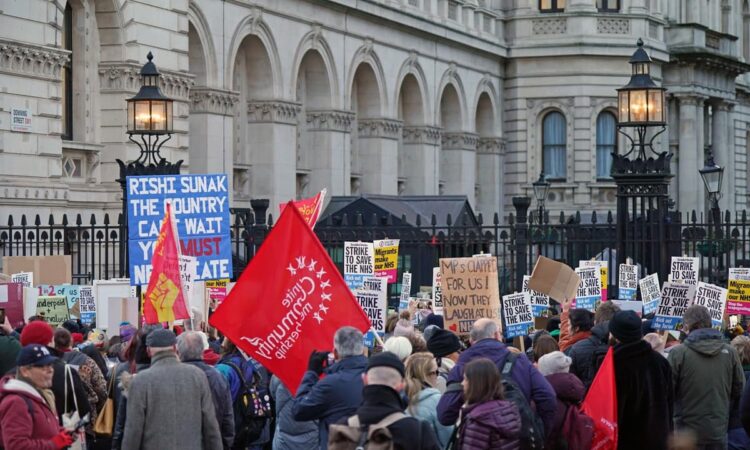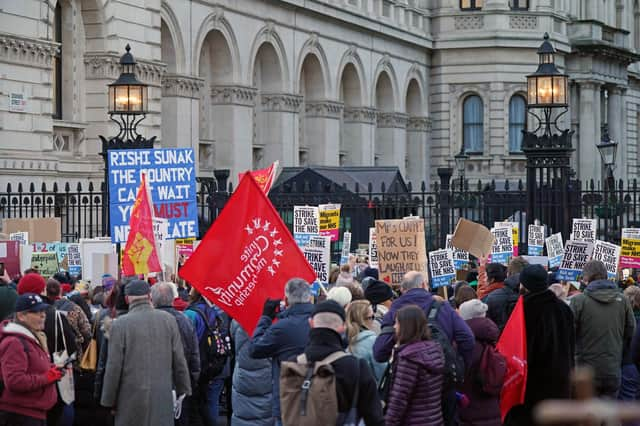Ben Lowry: We do not hear any of the arguments against strikes, such as generous public sector pensions



Among their biggest concerns was a backlash if they tackled public sector pay. What a joke, I remember thinking. The public sector pay package could indeed lead to social disorder – but the disorder would be among the rest of the population, if they knew how generous that pay package was, how their taxes fund it, and how they will never get anything remotely similar.
Above all the pay package is generous when it comes to pensions, which are so lavish in the public sector and which cost so much to fund that their cost to the Exchequer in London is immense. In the private sector such pensions were scrapped after bankrupted numerous once wealthy businesses.
It is often pointed out that public sector pay was traditionally lower than it was in the private sector but there were other compensations in the public realm. Terms and conditions were good, as was job security, hours, holidays – and of course pensions. There was prestige to the job. That is still so in places such as London. A civil servant in Whitehall might have skills that, in the private sector, would secure them a far bigger salary but they prefer the status and stimulation of working at the heart of government. But while that traditional understanding as to the pluses and minuses of working in the public sector still holds in some instances, it is mostly gone. In Northern Ireland public sector pay is actually higher than private sector, because the former is paid at national levels while the latter is paid at market (thus lower regional) pay rates, which are higher in wealthy parts such as SouthEast England.
I am not saying, as some economists do, the UK should adopt regional pay, in which public sector salaries in parts of the nation would be adjusted downwards. But I am saying that amid widespread strikes across the public sector we need to have a clear debate about the overall pay and conditions. This is not happening in this province. Coverage of the strikes is utterly lopsided. When I have asked reporters to get the other side to the story, as is elementary in a news report about a dispute, they struggle to find anyone who will even query strikers. Almost no Stormont MLAs will do.
Much of this is fear of being seen to be attacking employees in key services. I understand that reticence, having had abuse when I have made arguments against strikes. Yet when I make such points in forums such as the Nolan radio show, as many listeners will phone in to support what I am saying as oppose it. But such people who do not support strikes are not hearing anyone defend their view. Pensions are by far the best part of public sector pay, yet few people realise that because pensions seem complicated. These are almost invariably ‘final salary’ or ‘career average’ pensions, so-called ‘defined benefit’ pensions in which the pension paid depends on earnings and time served and the amount paid rises with inflation for life, with half of it then flipping over to a surviving spouse. These are extraordinarily expensive to fund. People until recently retired at 65 and died at 70. A pension only needed to subsidise them for five years. Now people die at 80+ and so the pension must last three times as long, for 15 years or maybe far longer.
This has wreaked havoc with private sector pensions and so almost all private employees have a ‘defined contribution’ scheme. A junior reporter on the regional press might earn £27,000 a year. If they contribute a defined 6% of their salary and their employer does the same, then £3,240 is put into their pension fund each year (12% of £27k). If such a reporter joins such a scheme at 25 and puts that amount in for 40 years, they will have £129,400 after the four decades. The fund will seem to grow far beyond that sum but it might not in fact be growing much more than inflation. In recent years, a pension fund will be doing well if it keeps up with prices and grows by 1% a year on top of that. In the above example, the fund will reach £175,000.
To buy an annuity (annual income for life) on the same terms as in the public sector would mean a 3.8% return at current best rates. Thus the £175k lump sum will generate around £6,000 a year. But most such journalists will get much less than that. Almost none have such job security at 25 to begin a pension and sustain it for 40 years. Private sector rarely has the security of the public sector.
Public sector pensions have been modestly reformed at points in the last two decades, and I know that many employees are now contributing more than 6% in order to get their generous pensions. But many such state employees are still retiring on half their salary, often after as little as 30 years.
I have been struck by the number of people who are retiring from highly pressured jobs in, say, dentistry or medicine, and I fully accept that many of them have been under intolerable pressure but it is the generosity of their pension schemes that allows such an early escape.
The day cannot be far off when large numbers of private sector employees begin to realise how far their pensions are behind public ones. The said private employee on £27k will find that a public sector equivalent is retiring on an inflation-linked pension of £13,500+.
Many workers who are taking action say that they are also striking over conditions, and it is true that parts of the public sector are at breaking point. I saw that up close when my parents needed end of life care. But many of those service problems also have their origins in political weakness, and the failure to take difficult decisions such as NHS reform, leading to gross overstretch.
Pensions are taking up an ever larger slice of the national income and if politicians will not consider further reform of gold-plated pensions, perhaps because they too are benefiting from them, then I suggest a simple solution. Let public sector pensions be cited alongside salaries. If a job pays, say, £45,000 and after X years you will be able to expect to retire on half that, £22,500, then also say such a pension would in the private market cost £600,000. That would help wider society understand better the huge divide in pension provision, and have a better sense of some of the overall pay deals.






